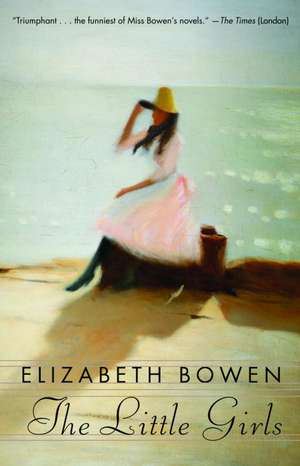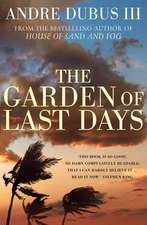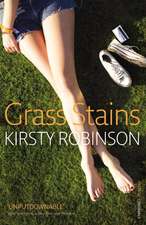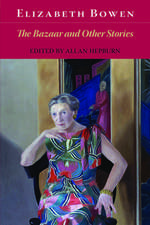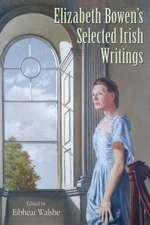The Little Girls
Autor Elizabeth Bowenen Limba Engleză Paperback – 30 iun 2004
As these radically different women confront one another and their shared secrets, the hard-won complacencies of their present selves are irrevocably shattered. In a novel as subtle and compelling as a mystery, Elizabeth Bowen explores the buried revelations—and the dangers—that attend the summoning up of childhood and the long-concealed scars of the past.
| Toate formatele și edițiile | Preț | Express |
|---|---|---|
| Paperback (2) | 100.04 lei 3-5 săpt. | +8.73 lei 5-11 zile |
| Vintage Publishing – 27 mai 1999 | 100.04 lei 3-5 săpt. | +8.73 lei 5-11 zile |
| Anchor Books – 30 iun 2004 | 106.86 lei 6-8 săpt. |
Preț: 106.86 lei
Nou
Puncte Express: 160
Preț estimativ în valută:
20.45€ • 22.23$ • 17.19£
20.45€ • 22.23$ • 17.19£
Carte tipărită la comandă
Livrare economică 21 aprilie-05 mai
Preluare comenzi: 021 569.72.76
Specificații
ISBN-13: 9781400034796
ISBN-10: 1400034795
Pagini: 320
Dimensiuni: 133 x 204 x 18 mm
Greutate: 0.24 kg
Ediția:Anchor Books.
Editura: Anchor Books
ISBN-10: 1400034795
Pagini: 320
Dimensiuni: 133 x 204 x 18 mm
Greutate: 0.24 kg
Ediția:Anchor Books.
Editura: Anchor Books
Notă biografică
Elizabeth Bowen was born in Dublin in 1899, the only child of an Irish lawyer and landowner. Her book Bowen's Court (1942) is the history of her family and their house, in County Cork. Throughout her life, she divided her time between London and Bowen's Court, which she inherited. She wrote many acclaimed novels and short story collections, was awarded the CBE in 1948, and was made a Companion of Literature by the Royal Society of Literature in 1965. She died in 1973.
Extras
1
A MAN came down the steps cut in the rock. By nature agile, he made the descent with unusual caution, placing each foot first tentatively then extra firmly. He did well to--the steps, inexpertly hewn at some unknown time, were no two alike, and were this evening slippery after rain; moreover, he carried, balanced against his midriff, a lidless white cardboard box toppling with a miscellany of objects.
He arrived on to the floor of a sort of bear pit; that was, a sunken circular court resembling those in which, in old-fashioned zoos, bears keep house and are displayed. This was, if anything, on the large and deep side; it lacked a pole in the middle and had no railing, being overhung round the top by beards of creeper and scrambling and sagging roses. Dahlias bloomed at the head of the steps. Across the uneven rock floor, facing the steps, was either a shallow cave or a deep recess--or possibly, unadorned grotto?--now fronted by looped-back tarpaulin curtains. Within were trestles, across which boards had been placed; and a woman, intent on what she was doing to the point of trance, could be seen in backview, moving her hands about among the objects crowding the rough table. A jotting-pad, which she from time to time attacked with a stub of pencil, caught such daylight as entered the cave. She may not have heard the man, who was wearing espadrilles--she did not, at any rate, look around.
He said: "Here I am."
"There you are," she assented, taking his word for it.
"Getting on?"
This time, instead of answering she came out to meet him, knocking hair back from her forehead with her wrist. Her sweater sleeves were rolled to above the elbows; out of a pocket of her slacks trailed a man's handkerchief with signs of being used as a duster. Shod as he was, she moved as soundlessly, lighting a cigarette as she came. To call her attention to his box, Frank Wilkins gave it a slight rattle. This acted: her face lit up. "Oh, you have!" she cried.
"What did you think I was up to?"
"Let's see!" She made a grab at the box.
"Steady!" said he, protecting it. "Taken me most of the day, getting these together. Made me quite introspective."
"Took your mind off the telephone?"
"Mm--I suppose so."
"Good."
Amicably going together into the cave, they cleared space on the table and put his box down. He eyed the exhibits already there, if not critically, with no great enthusiasm. "Still all look to me very much the same."
"Same as last time, or the same as each other?"
"Same as each other, in pretty much the same way as they did last time. Not had anything new in since?"
"One lot, but I'm hardly surprised if you didn't notice. It is extraordinary, really, isn't it, Frank? I suppose the fact is, people are much the same, if one goes down deep. All the variety seems to be on the surface. When one comes to think, what's amazing is--" But she broke off, as she often did. She drew once more on her cigarette, let it drop, and stamped on it. "Look, though," she cried with renewed fervour, "I've been cataloguing, before I forget what's whose. Once I do, there'll be little to tell me--or indeed anyone."
"How you expect posterity to make head or tail of it--!"
She smiled, otherwise took no notice. There are remarks which, having been once made, are repeated at intervals, on principle: Frank's was one of them. "Rightly or wrongly," she continued, "I never have done a catalogue before; yet this one's beginning to be so exactly like one--don't you think?" She held the pad with the jottings out at extreme arm's length, for admiration. He did not seem able to make sense of it. "Oh, bother you," she grumbled, "do put your specs on!" (That he was known to be slow to do, being loth to.) He objected: "We're right in our own light."
They were. Their two tall forms, backs to the entrance, not only overshadowed the table but further darkened the cave--blocking away from it outdoor daylight, which, down here, was subdued at the best of times. Only round noon did sun strike the circular pit's floor. It now was within an hour or so of sunset--unspent, brilliant after the rainstorm, long rays lay over the garden overhead, making wetness glitter, setting afire September dahlias and roses. Down here, however, it was some other hour--peculiar, perhaps no hour at all.
"Why not rig up some sort of lamp?" he wanted to know. "Don't you see, Dinah, the days will be drawing in."
"Dear, they've begun to!" She picked up a leather jerkin and, with his aid, slung it over her shoulders. Then Frank, whatever the visibility, could not resist giving a dig at his box--as nearly dispassionately as possible. A carved bone fan came slithering from the top. Dinah pounced on it, opened it, and held it round to the light. "This won't do," she declared sadly, "it's an antique!"
"It was my grandmother's."
"But Frank, darling--no ancestors, we did say!"
"I should have thought, the fact that I'd kept it always--"
"Obsession about it, had you?" she asked, more hopefully.
"More, there's something of her in me, I've sometimes thought--that is, from what I've heard of her. In some way or another, a likeness. Though, mind you, I never set eyes on her: she died young."
"At least you haven't done that."
"Looks, more--possibly."
"Oh, then a beauty, was she?"
Frank, opening his mouth, glanced at Dinah sideways: she looked so bland, he decided she must be méchante. Straightaway, he was furious. "You're going to look on the whole of it as a laugh, this box? As a give-away--that's how you see it, isn't it?" he shouted, intercepting her hand on its way back to his box and holding it under arrest, by the wrist, in mid-air. She waited for him to quiet down, then, disengaging her wrist with a gentle tug, said. "No; simply as what we agreed--a clue for posterity. Or, poser?"
"That's what you say; but--"
"None of the others," she said plaintively, "made this fuss."
"I am not the others!"
"Oh, no. No, no."
"I am not?" he insisted.
"No, I tell you. They understood the idea."
"Ho, they did, did they?"
"Before it's quite dark, mayn't we unpack your box?"
So they set to work, racing against the fading o[ the light--till, in the silence, a cough was heard from above. It was a compact, contained cough: no other followed. Dinah said: "I'm sure that is Mrs. Coral." They left the cave, one after the other, both looking up.
Mrs. Coral, cased in a mackintosh amid drippy dahlias, stood looking down at them. Soul of integrity, she as ever held herself wooden-straight. Her wide-boned face with wide eyes and strong, blunted features was like a Saxon carving outside a church; the childlike hat she wore was turned up all round. Stalwart as a fourteen-year-old, Mrs. Coral appeared a typical forty, though past that. She lived, at the other side of the village, in a semi-detached stone villa, and took in students (generally, foreign) from a nearby agricultural institute. Carrying a plastic mesh bag with magazines in it, she took one more step, now, towards the brink of the pit. "Good evening, Mrs. Delacroix. Busy, are you?"
"Do come in, Mrs. Coral--I mean, come down!"
"I've come about the Mothers' Union."
"You know Major Wilkins?"
Mrs. Coral regarded Frank, then said: "Good evening." Considering how candid and expectant, as well as tolerant, her stare was (turned alike on man, woman, or child), she took in wonderfully little of what she saw. Never more than one thing at a time could be in her mind, and it was always important, at least to her. And it always came out at once: she was not inscrutable. "I've got your magazine," she said, temptingly raising the mesh bag. "And I'm sorry, but there's still the subscription."
"Naturally--how much?"
Mrs. Coral told her, explaining: "You're a trifle behind."
"I am sorry," moaned Dinah.
"Not feeling I ought to let it run on too far, and not thinking you would care to have it run on too far, and not having noticed you at the last Meeting, I called in the other day, but you were in London."
"Oh, what a lot of trouble! And now I've left my money up at the house.--Unless you?" cried Dinah, turning to Frank in an at once inspired and pleading way. He tied knots with his eyebrows, but put his hand in his pocket. "Better than keeping Mrs. Coral waiting," she explained, picking the necessary silver from his palm. Mrs. Coral watched from above, neutrally, if anything favourably. It seemed natural that a gentleman should emit coins.
From up there, Mrs. Coral was seeing, somewhat foreshortened, a pair of ageless delinquents, whose random beauty was one of the most placid of their effronteries, or cheats: a cheating of Time. Nobody of their ages, it might be said, had any business to look as these two still did. It could be that looking as they did was the something in common which had brought them together. One hears of those who were behind the door when looks were being given out; but what about those who happen to be behind the door, or anyway elsewhere, when looks are being called in again? These two had, somehow, not handed back Nature's strictly temporary voucher. Possibly the collector had forgotten? They seem to have benefited by some oversight. Their teasing and needling of one another kept them in harmony, without rivalry, and was habitual. Tall and long-legged, they happened this evening to be, even, clad very much alike. His yellow springy hair and splendid moustache, lightened rather than grizzled by many summers, gave an additional glimmer to his countenance--in itself unusual, mobile, and sometimes wild. Her cut hair, slippery as a girl's, had darkened to the colour of vintage marmalade; her face was fair rather than pale. They were some time debating over the money: meanwhile, Mrs. Coral took them for granted.
Sum in hand, Dinah set off in a businesslike manner towards the steps.
"Now I must hand you your magazine," stated Mrs. Coral. "And I shall need to write you out your receipt. I should have a table, really. Is that one, down there?" Girding her mackintosh up, she eyed the descent. "Chickens were kept down here when I was a girl. Not a fox would come down these steps--they're funny. Times change," she remarked, on her way down. "Starting cactuses, are you?" She extracted the magazine as she neared the bottom.
"Not cactuses; but we're starting something."
"I was told I was likely to find you down here, if anywhere."
Frank, as host, asked: "Know anything about the history of this cave?"
"Only, Major Wilkins, that I always understood it was prehistoric." Mrs. Coral looked into the cave, impassively. "Now going to hold a jumble sale in it, are you?"
Throwing his head back, Frank gave a snorting laugh.
"Major Wilkins isn't laughing at you, he's laughing at me," Dinah interposed, looking his way austerely. Mrs. Coral took another look at the table. "I see: a small museum. I beg your pardon. But you should take care, working down here so late, particularly if you should happen to be rheumatic. This type of rock perspires; it always has done."
"That's what I'm always telling her!"
"All I hope is, you may not suffer from mildew on your exhibits."
Dinah, at the very idea, half-sneezed, dived for the trailing handkerchief, dabbed her nose. "It will soon be airtight: we're going to seal it up."
"It won't, then, be a public museum, will it?"
"It's not a museum--or really anything like. If you'd like to know, I'll try and explain. It's for someone or other to come upon in the far future, when practically nothing about any of us--you or me, for instance--would be otherwise known. We're putting these things in here to be deduced from. And by that time, hundreds or perhaps thousands of years hence, think what a shattering discovery! Imagine the theories it may revolutionize!"
"Why, yes," Mrs. Coral agreed, "I suppose it might do.--Which theories are you referring to, Mrs. Delacroix?"
"Any, of any kind, about us. Look what a fuss is made in newspapers, nowadays, about any odds and ends that are come upon--one or two sad beads, or splinters of pottery! Enormously learned theories are based upon them. Then of course there are arrowheads, daggers, and dinged-in skulls; but they give such a fractious, bad-tempered picture of life, I feel they must make one unfair to the vanished races. So I'm looking ahead to when we are a vanished race."
"Well, I never!" said the awed Mrs. Coral.
"Oh, yes. But now we come to what is really the point! I don't know how you feel, Mrs. Coral, but I should imagine the same as I do--now would you wish, simply because you'd vanished, simply to be thought about as a race--all, I mean, stuck together in one lump? I do think we deserve to be thought of as personalities: you as you, Major Wilkins as Major Wilkins, me as me. So for that, you see, one's got to arrange. Those early races probably never thought; or what I suppose is still more likely, never really expected they would vanish. But we should be odd--don't you agree?-- if the idea'd never occurred to us."
"Though, little is gained by brooding," said Mrs. Coral.
"How I agree! But the thing is, one should give posterity a break. One must leave posterity some clues!"
Mrs. Coral coughed. She then said: "Should there be any posterity."
"You won't get her to listen to a word of that!" remarked Frank, from a little distance away. Having moved off outdoors to light his pipe, he remained in the courtyard background, pacing and pausing, now and then looking up as rooks crossed the sky. For emphasis, he made a gesture at Mrs. Coral with his pipe. "She won't hear a word of it!" Mrs. Coral, looking from Frank to Dinah, for the first time in her visit appeared to dither--upon which Dinah, by dint of placing a hand on their visitor's mackintosh, at the elbow, confidently and swiftly reclaimed her audience. She went on:
"Clues to reconstruct us from. Expressive objects. What really expresses people? The things--I'm sure--that they have obsessions about: keep on wearing or using, or fuss when they lose, or can't go to sleep without. You know, a person's only a person when they have some really raging peculiarity--don't you notice that, Mrs. Coral, with all your friends?"
A MAN came down the steps cut in the rock. By nature agile, he made the descent with unusual caution, placing each foot first tentatively then extra firmly. He did well to--the steps, inexpertly hewn at some unknown time, were no two alike, and were this evening slippery after rain; moreover, he carried, balanced against his midriff, a lidless white cardboard box toppling with a miscellany of objects.
He arrived on to the floor of a sort of bear pit; that was, a sunken circular court resembling those in which, in old-fashioned zoos, bears keep house and are displayed. This was, if anything, on the large and deep side; it lacked a pole in the middle and had no railing, being overhung round the top by beards of creeper and scrambling and sagging roses. Dahlias bloomed at the head of the steps. Across the uneven rock floor, facing the steps, was either a shallow cave or a deep recess--or possibly, unadorned grotto?--now fronted by looped-back tarpaulin curtains. Within were trestles, across which boards had been placed; and a woman, intent on what she was doing to the point of trance, could be seen in backview, moving her hands about among the objects crowding the rough table. A jotting-pad, which she from time to time attacked with a stub of pencil, caught such daylight as entered the cave. She may not have heard the man, who was wearing espadrilles--she did not, at any rate, look around.
He said: "Here I am."
"There you are," she assented, taking his word for it.
"Getting on?"
This time, instead of answering she came out to meet him, knocking hair back from her forehead with her wrist. Her sweater sleeves were rolled to above the elbows; out of a pocket of her slacks trailed a man's handkerchief with signs of being used as a duster. Shod as he was, she moved as soundlessly, lighting a cigarette as she came. To call her attention to his box, Frank Wilkins gave it a slight rattle. This acted: her face lit up. "Oh, you have!" she cried.
"What did you think I was up to?"
"Let's see!" She made a grab at the box.
"Steady!" said he, protecting it. "Taken me most of the day, getting these together. Made me quite introspective."
"Took your mind off the telephone?"
"Mm--I suppose so."
"Good."
Amicably going together into the cave, they cleared space on the table and put his box down. He eyed the exhibits already there, if not critically, with no great enthusiasm. "Still all look to me very much the same."
"Same as last time, or the same as each other?"
"Same as each other, in pretty much the same way as they did last time. Not had anything new in since?"
"One lot, but I'm hardly surprised if you didn't notice. It is extraordinary, really, isn't it, Frank? I suppose the fact is, people are much the same, if one goes down deep. All the variety seems to be on the surface. When one comes to think, what's amazing is--" But she broke off, as she often did. She drew once more on her cigarette, let it drop, and stamped on it. "Look, though," she cried with renewed fervour, "I've been cataloguing, before I forget what's whose. Once I do, there'll be little to tell me--or indeed anyone."
"How you expect posterity to make head or tail of it--!"
She smiled, otherwise took no notice. There are remarks which, having been once made, are repeated at intervals, on principle: Frank's was one of them. "Rightly or wrongly," she continued, "I never have done a catalogue before; yet this one's beginning to be so exactly like one--don't you think?" She held the pad with the jottings out at extreme arm's length, for admiration. He did not seem able to make sense of it. "Oh, bother you," she grumbled, "do put your specs on!" (That he was known to be slow to do, being loth to.) He objected: "We're right in our own light."
They were. Their two tall forms, backs to the entrance, not only overshadowed the table but further darkened the cave--blocking away from it outdoor daylight, which, down here, was subdued at the best of times. Only round noon did sun strike the circular pit's floor. It now was within an hour or so of sunset--unspent, brilliant after the rainstorm, long rays lay over the garden overhead, making wetness glitter, setting afire September dahlias and roses. Down here, however, it was some other hour--peculiar, perhaps no hour at all.
"Why not rig up some sort of lamp?" he wanted to know. "Don't you see, Dinah, the days will be drawing in."
"Dear, they've begun to!" She picked up a leather jerkin and, with his aid, slung it over her shoulders. Then Frank, whatever the visibility, could not resist giving a dig at his box--as nearly dispassionately as possible. A carved bone fan came slithering from the top. Dinah pounced on it, opened it, and held it round to the light. "This won't do," she declared sadly, "it's an antique!"
"It was my grandmother's."
"But Frank, darling--no ancestors, we did say!"
"I should have thought, the fact that I'd kept it always--"
"Obsession about it, had you?" she asked, more hopefully.
"More, there's something of her in me, I've sometimes thought--that is, from what I've heard of her. In some way or another, a likeness. Though, mind you, I never set eyes on her: she died young."
"At least you haven't done that."
"Looks, more--possibly."
"Oh, then a beauty, was she?"
Frank, opening his mouth, glanced at Dinah sideways: she looked so bland, he decided she must be méchante. Straightaway, he was furious. "You're going to look on the whole of it as a laugh, this box? As a give-away--that's how you see it, isn't it?" he shouted, intercepting her hand on its way back to his box and holding it under arrest, by the wrist, in mid-air. She waited for him to quiet down, then, disengaging her wrist with a gentle tug, said. "No; simply as what we agreed--a clue for posterity. Or, poser?"
"That's what you say; but--"
"None of the others," she said plaintively, "made this fuss."
"I am not the others!"
"Oh, no. No, no."
"I am not?" he insisted.
"No, I tell you. They understood the idea."
"Ho, they did, did they?"
"Before it's quite dark, mayn't we unpack your box?"
So they set to work, racing against the fading o[ the light--till, in the silence, a cough was heard from above. It was a compact, contained cough: no other followed. Dinah said: "I'm sure that is Mrs. Coral." They left the cave, one after the other, both looking up.
Mrs. Coral, cased in a mackintosh amid drippy dahlias, stood looking down at them. Soul of integrity, she as ever held herself wooden-straight. Her wide-boned face with wide eyes and strong, blunted features was like a Saxon carving outside a church; the childlike hat she wore was turned up all round. Stalwart as a fourteen-year-old, Mrs. Coral appeared a typical forty, though past that. She lived, at the other side of the village, in a semi-detached stone villa, and took in students (generally, foreign) from a nearby agricultural institute. Carrying a plastic mesh bag with magazines in it, she took one more step, now, towards the brink of the pit. "Good evening, Mrs. Delacroix. Busy, are you?"
"Do come in, Mrs. Coral--I mean, come down!"
"I've come about the Mothers' Union."
"You know Major Wilkins?"
Mrs. Coral regarded Frank, then said: "Good evening." Considering how candid and expectant, as well as tolerant, her stare was (turned alike on man, woman, or child), she took in wonderfully little of what she saw. Never more than one thing at a time could be in her mind, and it was always important, at least to her. And it always came out at once: she was not inscrutable. "I've got your magazine," she said, temptingly raising the mesh bag. "And I'm sorry, but there's still the subscription."
"Naturally--how much?"
Mrs. Coral told her, explaining: "You're a trifle behind."
"I am sorry," moaned Dinah.
"Not feeling I ought to let it run on too far, and not thinking you would care to have it run on too far, and not having noticed you at the last Meeting, I called in the other day, but you were in London."
"Oh, what a lot of trouble! And now I've left my money up at the house.--Unless you?" cried Dinah, turning to Frank in an at once inspired and pleading way. He tied knots with his eyebrows, but put his hand in his pocket. "Better than keeping Mrs. Coral waiting," she explained, picking the necessary silver from his palm. Mrs. Coral watched from above, neutrally, if anything favourably. It seemed natural that a gentleman should emit coins.
From up there, Mrs. Coral was seeing, somewhat foreshortened, a pair of ageless delinquents, whose random beauty was one of the most placid of their effronteries, or cheats: a cheating of Time. Nobody of their ages, it might be said, had any business to look as these two still did. It could be that looking as they did was the something in common which had brought them together. One hears of those who were behind the door when looks were being given out; but what about those who happen to be behind the door, or anyway elsewhere, when looks are being called in again? These two had, somehow, not handed back Nature's strictly temporary voucher. Possibly the collector had forgotten? They seem to have benefited by some oversight. Their teasing and needling of one another kept them in harmony, without rivalry, and was habitual. Tall and long-legged, they happened this evening to be, even, clad very much alike. His yellow springy hair and splendid moustache, lightened rather than grizzled by many summers, gave an additional glimmer to his countenance--in itself unusual, mobile, and sometimes wild. Her cut hair, slippery as a girl's, had darkened to the colour of vintage marmalade; her face was fair rather than pale. They were some time debating over the money: meanwhile, Mrs. Coral took them for granted.
Sum in hand, Dinah set off in a businesslike manner towards the steps.
"Now I must hand you your magazine," stated Mrs. Coral. "And I shall need to write you out your receipt. I should have a table, really. Is that one, down there?" Girding her mackintosh up, she eyed the descent. "Chickens were kept down here when I was a girl. Not a fox would come down these steps--they're funny. Times change," she remarked, on her way down. "Starting cactuses, are you?" She extracted the magazine as she neared the bottom.
"Not cactuses; but we're starting something."
"I was told I was likely to find you down here, if anywhere."
Frank, as host, asked: "Know anything about the history of this cave?"
"Only, Major Wilkins, that I always understood it was prehistoric." Mrs. Coral looked into the cave, impassively. "Now going to hold a jumble sale in it, are you?"
Throwing his head back, Frank gave a snorting laugh.
"Major Wilkins isn't laughing at you, he's laughing at me," Dinah interposed, looking his way austerely. Mrs. Coral took another look at the table. "I see: a small museum. I beg your pardon. But you should take care, working down here so late, particularly if you should happen to be rheumatic. This type of rock perspires; it always has done."
"That's what I'm always telling her!"
"All I hope is, you may not suffer from mildew on your exhibits."
Dinah, at the very idea, half-sneezed, dived for the trailing handkerchief, dabbed her nose. "It will soon be airtight: we're going to seal it up."
"It won't, then, be a public museum, will it?"
"It's not a museum--or really anything like. If you'd like to know, I'll try and explain. It's for someone or other to come upon in the far future, when practically nothing about any of us--you or me, for instance--would be otherwise known. We're putting these things in here to be deduced from. And by that time, hundreds or perhaps thousands of years hence, think what a shattering discovery! Imagine the theories it may revolutionize!"
"Why, yes," Mrs. Coral agreed, "I suppose it might do.--Which theories are you referring to, Mrs. Delacroix?"
"Any, of any kind, about us. Look what a fuss is made in newspapers, nowadays, about any odds and ends that are come upon--one or two sad beads, or splinters of pottery! Enormously learned theories are based upon them. Then of course there are arrowheads, daggers, and dinged-in skulls; but they give such a fractious, bad-tempered picture of life, I feel they must make one unfair to the vanished races. So I'm looking ahead to when we are a vanished race."
"Well, I never!" said the awed Mrs. Coral.
"Oh, yes. But now we come to what is really the point! I don't know how you feel, Mrs. Coral, but I should imagine the same as I do--now would you wish, simply because you'd vanished, simply to be thought about as a race--all, I mean, stuck together in one lump? I do think we deserve to be thought of as personalities: you as you, Major Wilkins as Major Wilkins, me as me. So for that, you see, one's got to arrange. Those early races probably never thought; or what I suppose is still more likely, never really expected they would vanish. But we should be odd--don't you agree?-- if the idea'd never occurred to us."
"Though, little is gained by brooding," said Mrs. Coral.
"How I agree! But the thing is, one should give posterity a break. One must leave posterity some clues!"
Mrs. Coral coughed. She then said: "Should there be any posterity."
"You won't get her to listen to a word of that!" remarked Frank, from a little distance away. Having moved off outdoors to light his pipe, he remained in the courtyard background, pacing and pausing, now and then looking up as rooks crossed the sky. For emphasis, he made a gesture at Mrs. Coral with his pipe. "She won't hear a word of it!" Mrs. Coral, looking from Frank to Dinah, for the first time in her visit appeared to dither--upon which Dinah, by dint of placing a hand on their visitor's mackintosh, at the elbow, confidently and swiftly reclaimed her audience. She went on:
"Clues to reconstruct us from. Expressive objects. What really expresses people? The things--I'm sure--that they have obsessions about: keep on wearing or using, or fuss when they lose, or can't go to sleep without. You know, a person's only a person when they have some really raging peculiarity--don't you notice that, Mrs. Coral, with all your friends?"
Recenzii
“Triumphant . . . the funniest of Miss Bowen’s novels.” —The Times (London)
“This story is poetic in its awareness, its stimulus, its beauty of writing; and as full of clues, hints and half-revealed secrets as any thriller.” —The Scotsman (Edinburgh)
“Bowen so thoroughly knows the world she is writing about that she contrives to appear to convey it to us whole. Her fictional insight is made solid by sound psychological insight.” –The New York Times
“This story is poetic in its awareness, its stimulus, its beauty of writing; and as full of clues, hints and half-revealed secrets as any thriller.” —The Scotsman (Edinburgh)
“Bowen so thoroughly knows the world she is writing about that she contrives to appear to convey it to us whole. Her fictional insight is made solid by sound psychological insight.” –The New York Times
Descriere
Descriere de la o altă ediție sau format:
In 1914 they had been eleven years old; Fifty years later, Dinah, beautiful as ever, advertises in the national newspapers to find the other two - Clare, now established with a successful business, and Sheila, a married woman, glossy, chic and correct. What are the revelations - and the dangers - in summoning up childhood?
In 1914 they had been eleven years old; Fifty years later, Dinah, beautiful as ever, advertises in the national newspapers to find the other two - Clare, now established with a successful business, and Sheila, a married woman, glossy, chic and correct. What are the revelations - and the dangers - in summoning up childhood?
